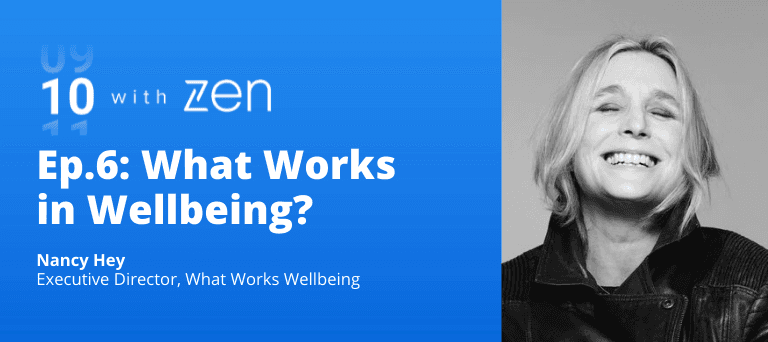Andrew King
17 May 2021
10
min read

The phrase ‘wellbeing’ has been used increasingly over the last few years and has been searched for online even more frequently since the start of the pandemic. To break down its definition (or lack thereof) and to learn how to best consider wellbeing in schools, Helen Woodward talked with Nancy Hey, Executive Director of What Works Wellbeing.
We’ve written out a transcript of the interview below, but you can listen to the podcast in full right here!
HW: Welcome to 10 with Zen, Nancy!
NH: Hello, great to be here. Thanks for having me.
HW: Nancy, you have a background in the civil service, in particular leading learning to support policy development, and you’ve been a private secretary to two government ministers as well.
NH: That’s right!
HW: First of all, do tell us briefly about What Works Wellbeing.
NH: So The What Works Centre for Wellbeing is the UK’s national body for wellbeing policy, practice and evidence. We’re working to understand what organisations can do to improve wellbeing. So organisations in the public sector, private sector and in civil society.
HW: What we love about What Works Wellbeing is the commitment to developing and sharing evidence-based work, and I know you use this to improve decision making with government business and with charities. What does the evidence tell us about how school leaders can support their teams?
NH: This is a great question. So, we work with employers in all contexts to understand what they can do to improve wellbeing. And what’s exciting is they basically have understood and committed brilliantly to the wellbeing of their staff, and their customers in many cases. “What can they do” is now the question. The first thing I would say is know your people, know your context, and know how the drivers of wellbeing play out in that context. So you need to avoid being persuaded to do something just because another organisation has chosen to, or because someone’s trying to sell you something. Think about what you need in your context. So that could be that you’ve got people of different ages or you’ve got people that you need to keep safe, physically, emotionally or financially, for example. People work for people, so we’re thinking about people’s physical and mental health, and their relationships with peers, managers and the people they work with - their students, their parents and families and colleagues across their sector.
HW: So there’s a big emphasis there on being specific around your context, not just treating it like a buffet and saying ‘they do that, so we should try that’.
NH: Yes, we wouldn’t do that in our teaching right? So why would we do that with staff wellbeing? It’s possible that we don’t know quite as much in some areas as we do in educational attainment but we do know quite a lot, and lots of things work. But knowing what’s right for you in your context is really important.
HW: So what does the research tell us about caring for our own mental health? Because lots of people are concerned about this at the moment, for obvious reasons. What can we do to help take care of ourselves?
NH: This is a great question - so actually most people understand wellbeing as how it relates to themselves, rather than how it relates to their organisation or their community. For ourselves there’s lots of science-backed summaries that you can pick up and use as your rule of thumb. So the ones that I would recommend: the five ways to wellbeing is brilliant. They’re not necessarily the most important things, but they’re 5 things that you can do. So connect, be active, keep learning, take notice and give. For young people, they switch out ‘give’ for ‘be creative and play’. But you can do that as an adult too, we know that being creative can be a very helpful coping strategy, reading and things like that, during the pandemic. And certainly things like being active outdoors has been a really effective coping strategy. As has working, interestingly. Then there’s other ones as well, Action for Happiness have Great Dream, and they have their regular monthly calendars, all with evidence informed behind them. Or there’s one that I’m a big fan of, it’s been used in South Australia across the whole state, PERMA+. This is again a rule of thumb that’s quite nice. PERMA is ‘positive emotion’, ‘engagement’ (or ‘flow’), ‘relationships’, ‘meaning’, and ‘achievement’, and we’ll come back to those I think a bit later on. The ‘plus’ bit is physical activity, which really makes a big difference, your fruit and veg, sleep and optimism. So those are science-backed drivers. There’s also some great online platforms that are really thoroughly evidence-based, so I advise on Public Health England’s Every Mind Matters campaign, on which you can get your own ‘mind plan’ and millions of people have done so. Or Student Space, which is one for higher education students.
HW: I didn’t know about either of those, that’s really helpful, thank you. My last big question is: there’s lots of talk about the need to ‘do wellbeing’ with children and young people before they can be ready to learn. I’m interested in what the research tells us, because I accept that we all need to be in a good emotional state to be able to learn. But does it actually completely preclude us from being able to learn?
NH: I really think this is a great question, I think we get quite confused here. ‘Do wellbeing’, I’m not quite sure what that is! It’s kind of something that’s thrown out, there are some things that are more specifically wellbeing activities, and they could be about making sure everyone has breakfast in the morning, or they could be social/emotional relationships or learning. One of the things I would pull out, you’ve heard from my five ways to wellbeing, another one is that learning and achievement and flow are all things that help us with our wellbeing. It’s also not about being ‘happy all the time’. We have this conundrum where having a job is important for wellbeing, but one of the places we’re least happy is at work. Doing hard things well, we’re often in that learning pit and we get through that learning pit with good support, good feedback and that learning, achievement and growth keeps us and helps us build our wellbeing. So I think it can be complimentary.
HW: So there is something there about being engaged in learning, being involved in it, and that sense of flow, and actually building our competence and our skills in being able to struggle and learn is good for our sense of achievement and confidence and wellbeing.
NH: It’s not normal to be happy all the time, right? There’s lots of positive and negative emotions available, and I think we need to get that balance right. We do notice negative emotions more strongly, 3 times as strongly. So you do need much more positive emotion around, but that positive emotion could just be contentment and calm, and shared interest. And that’s really good too.
HW: And I didn’t know that! I didn’t know we feel negative emotions more strongly. That’s really interesting.
NH: We notice them because they help keep us safe, right? And that’s quite important. These emotions are just information, they help us understand what’s going around in our world. Are we aware of our emotions? Do we know what to do when we feel them? And how can we learn from them and use them to help us succeed?
HW: Yes, and that’s a really interesting idea, that we can learn about our emotions, and we can learn to manage our emotions. We can learn to notice them, and be present with them, but not necessarily be overwhelmed by them.
NH: Yes, and they’re strong, right? They can completely catch us. Being able to notice them, being able to name them, and being able to say them – and notice them in other people – are all social-emotional skills that we can learn. That’s probably more what I would call ‘doing wellbeing’, those types of skills. But they are one part of doing wellbeing. Being safe in the classroom is probably fairly important too.
HW: Absolutely.
NH: And having supporting friends and a trusted adult, and physical activity, these are the things that I would call ‘doing wellbeing’.
HW: And lots of research for looked-after children, and children that come through children’s safeguarding processes, about the significance of one trusted adult - how hugely significant and life changing that can be. So Nancy, I’m really keen to know what you’re currently working on?
NH: There’s a couple of things that I think are particularly relevant. So one is we’re working on a project with a number of organisations to review children and young people’s wellbeing measures, and we are part of a pilot with Greater Manchester secondary schools to measure children and young people’s wellbeing across the city. It’s really exciting! We’re also looking at the impact of a pandemic on different groups, and of the drivers of wellbeing across the nation, both currently and for the long-term as well.
HW: Nancy, thank you so much for being our guest today, I’m definitely going to be visiting the What Works Wellbeing website to search out more of the evidence!
We’d like to thank Nancy and Helen once again for taking part. For more insight on wellbeing in schools, why not view our Towards Positive Mental Health and Wellbeing webinar from earlier this year?




